Plextor Updates The Firmware on M5 Pro: Promises Increased Performance, We Test It
by Kristian Vättö on December 10, 2012 2:30 PM ESTEarlier this week Plextor put out a press release about a new firmware for the M5 Pro SSD. The new 1.02 firmware is branded "Xtreme" and Plextor claims increases in both sequential write and random read performance. We originally reviewed the M5 Pro back in August and it did well in our tests but due to the new firmware, it's time to revisit the M5 Pro. It's still the only consumer SSD based on Marvell's 88SS9187 controller and it's one of the few that uses Toshiba's 19nm MLC NAND as most manufacturers are sticking with Toshiba's 24nm MLC for now.
It's not unheard of for manufacturers to release faster firmware updates even after the product has already made it to market. OCZ's Vertex 4 is among the most well known for its firmware updates because OCZ didn't provide just one, but two firmware updates that increased performance by a healthy margin. The SSD space is no stranger to aggressive launch schedules that force products out before they're fully baked. Fortunately a lot can be done via firmware updates.
The new M5 Pro firmware is already available at Plextor's site and the update should not be destructive, although we still strongly suggest that you have an up-to-date backup before flashing the drive. I've compiled the differences between the new 1.02 firmware and older versions in the table below:
| Plextor M5 Pro with Firmware 1.02 Specifications | |||
| Capacity | 128GB | 256GB | 512GB |
| Sequential Read | 540MB/s | 540MB/s | 540MB/s |
| Sequential Write | 340MB/s -> 330MB/s | 450MB/s -> 460MB/s | 450MB/s -> 470MB/s |
| 4KB Random Read | 91K IOPS -> 92K IOPS | 94K IOPS -> 100K IOPS | 94K IOPS -> 100K IOPS |
| 4KB Random Write | 82K IOPS | 86K IOPS | 86K IOPS -> 88K IOPS |
The 1.02 firmware doesn't bring any major performance increases and the most you'll be getting is 6% boost in random read speed. To test if there are any other changes, I decided to run the updated M5 Pro through our regular test suite. I'm only including the most relevant tests in the article but you can find all results in our Bench. The test system and benchmark explanations can be found in any of our SSD reviews, such as the original M5 Pro review.
AnandTech Storage Bench
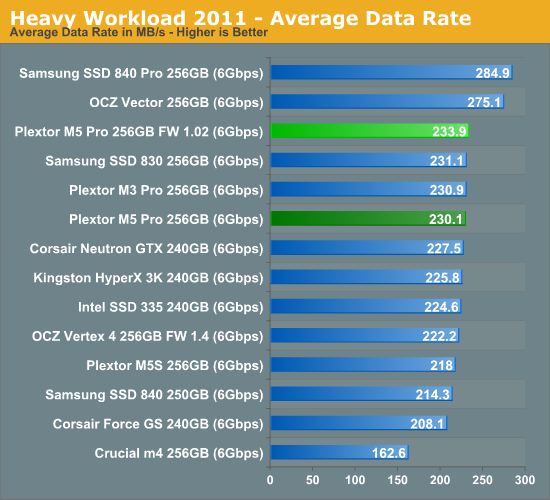
In our storage suites, the 1.02 firmware isn't noticeably faster. In our Heavy suite the new firmware is able to pull 3.8MB/s (1.7%) higher throughput but that falls within the range of normal run to run variance. The same applies to the Light suite test where the new firmware is actually slightly slower.
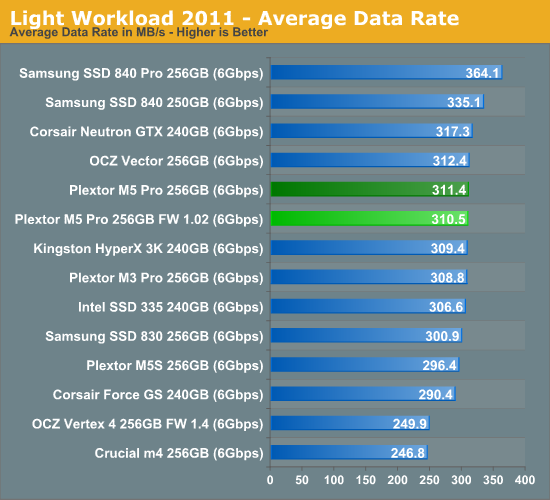 '
'
Random & Sequential Read/Write Speed
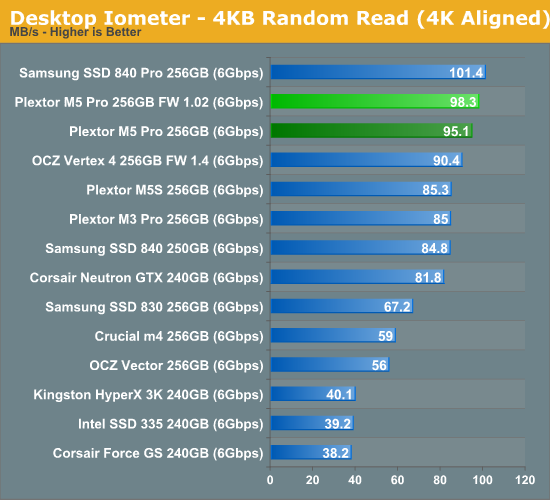
Random speeds are all up by 3-5%, though that's hardly going to impact real world performance.
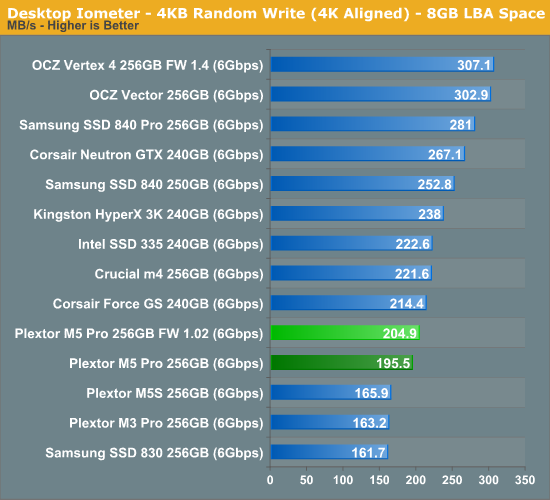
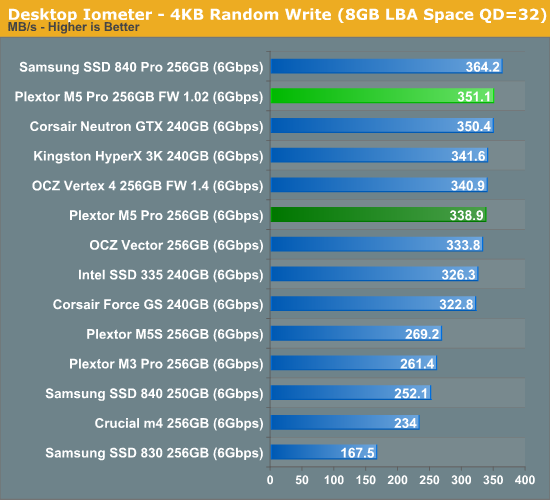
Sequential speeds are essentially not changed at all and the M5 Pro is still a mid-range performer.
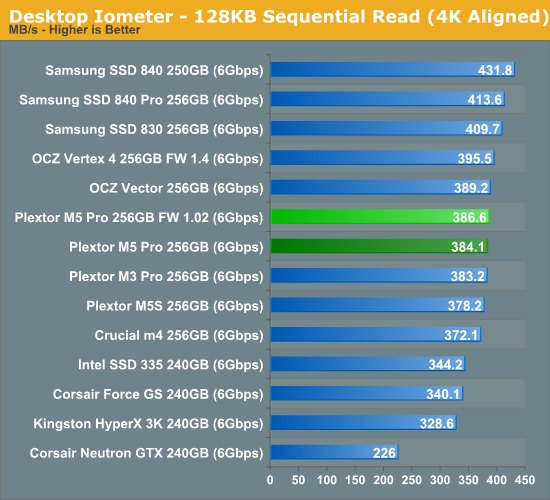
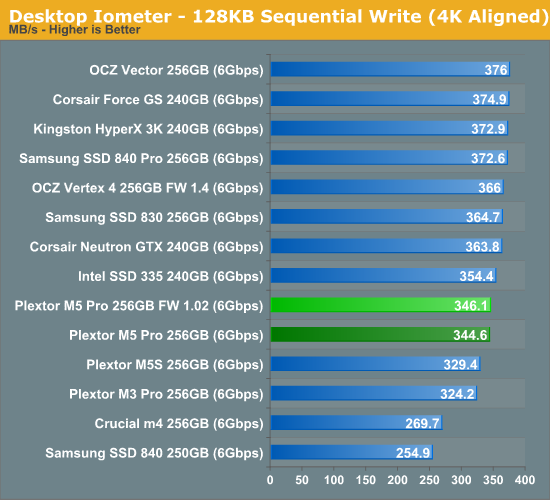










46 Comments
View All Comments
JonnyDough - Monday, December 10, 2012 - link
I'm a bit sad the Intel 520 isn't represented here.Kristian Vättö - Monday, December 10, 2012 - link
I only included Intel SSD 335 240GB because it's newer and actually a bit faster. You can always use our Bench tool to compare any SSD, here's M5 Pro versus 520:http://www.anandtech.com/bench/Product/731?vs=529
JonnyDough - Monday, December 10, 2012 - link
I got a 240GB drive from a forum guy for $160 shipped. Seemed like a great deal on a solid drive. Besides, I thought that a lot of people have the 520.mckirkus - Monday, December 10, 2012 - link
This drive scores well in the Anandtech Storage Benchmarks. So my question is whether it means your test doesn't measure impact of IO consistency or if it simply doesn't matter in the real world?Kristian Vättö - Monday, December 10, 2012 - link
Our Storage Suites are run on an empty drive, whereas in the IO consistency test the drive is first filled with sequential data before being hammered by 4KB random writes. The Storage Suites also consist of various IOs with different transfer sizes, queue depths and data patterns and as we have shown before, sequential writes recover performance with most SSDs. The SSD is also not being subjected to IO load all of the time, there are lots of idle periods where the SSD can do GC to recover performance.So, our Storage Suites don't fully ignore IO consistency but it's hard to say how much of an impact the M5 Pro's IO consistency has on its scores.
TemjinGold - Monday, December 10, 2012 - link
Curious as to why this metric HASN'T been reviewed yet? I'm sure a lot of us would be curious as to how all the major SSDs do in this.skytrench - Monday, December 10, 2012 - link
The test is hitting the drive so hard, that cleanup operations don't have time to improve matters. More testing is needed. Few usage patterns would resemble indefinite 4KB random writes.jwilliams4200 - Monday, December 10, 2012 - link
You need to examine the latency for this SSD to see what it is doing. Like you, I was surprised when I first saw the M5P dropping down to such low IOPS under sustained heavy load. Basically, the M5P is rapidly switching between two modes -- a slow throughput mode (presumably doing GC) and a high throughput mode. It certainly does not look pretty when you plot it out.But there are two (possibly) mitigating factors:
1) The average throughput isn't terrible, especially with at least 20% OP. The more OP, the greater percentage of time the SSD spends in the high throughput mode, thus raising the average throughput. The average throughput still is not as good as the Vector, Neutron, or 840 Pro, but it is not as bad as it looks on the graph.
M5P with 0% OP (avg 7MB/s):
http://i.imgur.com/30ZDE.png
M5P with 20% OP (avg 75MB/s):
http://i.imgur.com/yj0cF.png
2) Importantly, Plextor appears to put an ABSOLUTE cap on worst-case latency. I have never seen the latency go over 500ms, no matter what you throw at it. For comparison, with the Samsung 840 Pro, with no OP and a very heavy load, the latency will, very occasionally, go over even 1000ms. You can easily see the bimodal distribution of latencies for the Plextor if you look at the normal probability scale CDF plot. It seems that Plextor has tuned the firmware so that whenever it is in the slow mode doing GC, it has an absolute limit of 500ms before any IO returns. I guess the price to be paid for that absolute latency cap is that the average and worst-case throughput is lower than the competition -- but not so much lower that nobody could consider it an acceptable trade-off in order to gain the absolute cap on worst-case latency.
M5P with 0% OP, worst-case latency 500ms:
http://i.imgur.com/pVmWQ.png
Samsung 840 Pro with 0% OP, worst-case latency >1000ms:
http://i.imgur.com/fjA7N.png
Personally, I would still choose the 840 Pro over the Plextor for sustained heavy workloads (I would overprovision either SSD by at least 20%) because the 840 Pro has much better average latency. But I can imagine that some applications might benefit from the absolute 500ms cap on worst-case latency that the Plextor provides.
Note that none of this really matters for the consumer workloads most people would put an SSD under. Under most consumer workloads, neither the Plextor nor any of the others would have performance drops anywhere near as bad as shown in these sustained heavy workload conditions.
Kevin G - Monday, December 10, 2012 - link
This makes me wonder Plextor has optimized their firmware for more consumer oriented loads. They typically have a lower queue depthckevin1 - Tuesday, December 11, 2012 - link
Great analysis, thank you!The max latency constraint is very clear from the graphs you generated. It's not that the firmware is "bad" necessarily, it is just optimizing for a different performance measurement, one that Anandtech doesn't cover.
I think an analysis of whether max latency is ever important than max throughput would be interesting, along with some data on how the Plextor compares to other drives in this alternate metric.